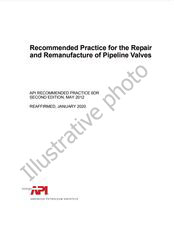We need your consent to use the individual data so that you can see information about your interests, among other things. Click "OK" to give your consent.

API 570-ed.5
Piping Inspection Code: In-service Inspection, Rating, Repair, and Alteration of Piping Systems
Translate name
STANDARD published on 1.2.2024
The information about the standard:
Designation standards: API 570-ed.5
Publication date standards: 1.2.2024
SKU: NS-1168739
The number of pages: 88
Approximate weight : 295 g (0.65 lbs)
Country: American technical standard
Category: Technical standards API
Annotation of standard text API 570-ed.5 :
API 570, 5th Edition, February 2024 - Piping Inspection Code: In-service Inspection, Rating, Repair, and Alteration of Piping Systems
General Application
Coverage
API 570 covers inspection, rating, repair, and alteration procedures for metallic piping systems and their associated pressure-relieving devices (PRDs) that have been placed in-service. This inspection code applies to all hydrocarbon and chemical process piping covered in 1.2.1 that have been placed in-service unless specifically designated as optional per 1.2.2. This publication does not cover inspection of specialty equipment including impulse tubing, sensory tubing or tubing associated with instrumentation, exchanger tubes, and control valves. However, this piping code could be used by owner-operators in other industries and other services at their discretion.
Process piping systems that have been decommissioned from service and abandoned in place are no longer covered by this in-service inspection code. However, abandoned in place piping may still need some amount of inspection and/or risk mitigation to ensure that it does not become a safety hazard due to continued deterioration. Process piping systems that are temporarily out of service or idled but have been mothballed (preserved for potential future use) are still covered by this code.
Intent
The intent of this code is to specify the in-service inspection and condition-monitoring program, as well as repair guidance that is needed to determine and maintain the ongoing integrity of piping systems. That program should provide reasonably accurate and timely assessments to determine if any changes in the condition of piping could possibly compromise continued safe operation. It is also the intent of this code that owner-operators shall respond to any inspection results that require corrective actions to ensure that the continued integrity of piping is consistent with appropriate risk analysis. API 570 is intended for use by organizations that maintain or have access to an authorized inspection agency, a repair organization, and piping engineers, inspectors, and examiners, all as defined in Section 3.
This code does not cover source inspection of newly fabricated pressure piping. Refer to API 588 for guidance on the surveillance of supplier vendors fabricating and/or repairing pressure piping that will be installed on-site. Owner-operators may engage the services of individuals qualified and certified in accordance with API 588 or this code.
However, inspections after new piping systems arrive on-site may still be needed at owner-operator option depending upon quality of shop inspection services and owner-operator specifications during fabrication.
Limitations
API 570 shall not be used as a substitute for the original construction requirements governing a piping system before it is placed in-service; nor shall it be used in conflict with any prevailing regulatory requirements. If the requirements of this code are more stringent than the regulatory requirements, then the requirements of this code shall govern.
Special Applications
Included Fluid Services
Except as provided in 1.2.2, API 570 applies to piping systems for process fluids that are hazardous to personnel, such as hydrocarbons, and similar flammable or toxic fluid services and processes.
The following are processes, services, and product state that are applicable:
- a) catalyst lines;
- b) hydrogen, natural gas, fuel gas, and flare systems;
- c) sour water and hazardous waste streams;
- d) hazardous fluid services;
- e) cryogenic fluids, such as liquid N2, H2, O2, and air;
- f) gaseous He, H2, O2, and N2 at pressures greater than 150 psig.
Optional Piping Systems and Fluid Services
The fluid services and classes of piping systems listed below are optional when applying requirements of API 570:
- a) hazardous fluid services below designated threshold limits, as defined by jurisdictional regulations;
- b) water (including fire protection systems), steam, steam-condensate, boiler feed water, and Category D fluid services as defined in ASME B31.3;
- c) other classes of piping that are exempted from the applicable process piping code.
Fitness-For-Service and Risk-based Inspection
This inspection code recognizes Fitness-For-Service concepts for evaluating in-service damage of pressure-containing piping components. API 579-1/ASME FFS-1 provides detailed Fitness-For-Service assessment procedures for specific types of damage that are referenced in this code.
This inspection code also recognizes risk-based inspection (RBI) concepts for determining inspection intervals or due dates and strategies. API 580 provides the basic minimum and recommended elements for developing, implementing, and maintaining an RBI program for fixed equipment, including piping. API 581 provides a set of methodologies for assessing risk (both probability of failure and consequence of failure) and for developing inspection plans.
We recommend:
Technical standards updating
Do you want to make sure you use only the valid technical standards?
We can offer you a solution which will provide you a monthly overview concerning the updating of standards which you use.
Would you like to know more? Look at this page.



 Cookies
Cookies
